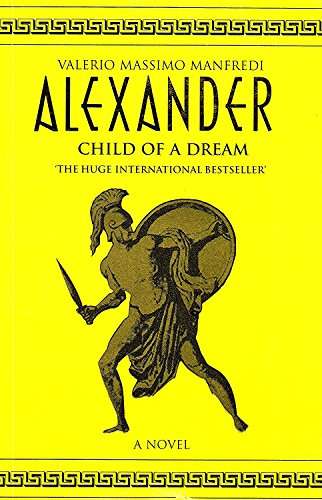
Alexander: Child of a Dream by Valerio Massimo Manfredi
Check my rate
| Main centres: | 1-3 business days |
| Regional areas: | 3-4 business days |
| Remote areas: | 3-5 business days |

| Main centres: | 1-3 business days |
| Regional areas: | 3-4 business days |
| Remote areas: | 3-5 business days |
Published by Macmillan, 2001, softcover, 352 pages, condition: as new.
Dr Valerio Massimo Manfredi is an Italian historian, journalist and archaeologist. He has published seven novels, including the bestselling Alexander trilogy, for which the American Biographical Institute voted him Man of the Year in 1999. He is married with two children and lives in a small town hear Bologna.
I discovered Valerio Massimo Manfredi's Alexander trilogy during my student days when one of my friends recommended it. My friend had a dog whose name was Peritas. It was the exact same name as Alexander's dog. It was very unusual, because I didn't know anyone else who has a dog with a classical ancient Greek name. I got the book at some point, when I could afford to buy it, but I never got around to reading it, because it was too big for me. But after I read 'Captivity' by György Spiró recently, I got very excited about the history of the ancient world and I thought I'll read another historical novel set in Ancient Greece or Rome. Sometime later, I opened an old box filled with books, and this Alexander trilogy leapt at me. It looked clearly like a sign given by the old Greek gods. How can one resist that? So I picked up the first book of the trilogy and finished reading it today.
This first part of the trilogy tells the story from around the time of Alexander's birth and ends at the time Alexander sets sail on his fleet to Asia. My knowledge about Alexander is very sketchy based on stories I've read here or there. And because of that I learnt a lot through this book. Manfredi is a historian and so his knowledge and research shines through in every page. However the historical facts blend into the story and don't overwhelm it. One of the fascinating things I learnt is that Alexander is Macedonian and not Greek. Macedonia is a totally different country with a different language. When I learnt history in school, the general impression created by the textbook and the teachers was that Macedonians were Greeks like the Spartans or the Athenians or the Thebans. While the Spartans and the Athenians and the Thebans were Greeks, though they frequently fought with each other, they both regarded Macedonians as outsiders and they united together when the Macedonians threatened them, because they regarded the Macedonians as the common enemy. So Alexander, the greatest conqueror from ancient times, was Macedonian, not Greek. I think this is a very important distinction. Atleast this is what I learnt from this book. There is a country called North Macedonia today. I am wondering how it is related to Alexander's Macedonia.
Manfredi's prose is simple and spare and moves the story along at a beautiful pace. The descriptions of those ancient times the countryside, nature, mountains, the food, clothes, jewellery, culture it is beautiful and feels authentic. The battle scenes are also vivid and it feels very real.